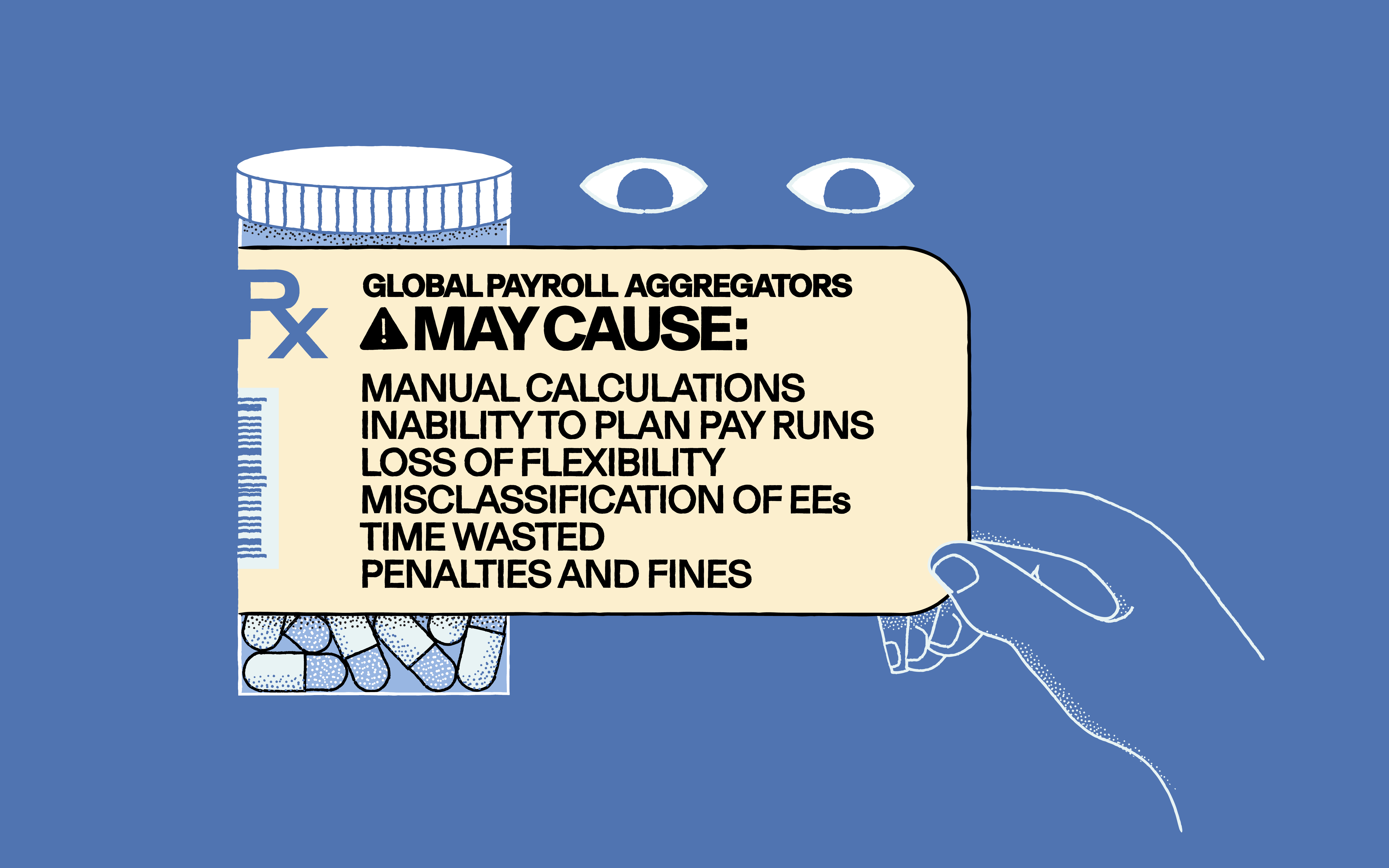How to run international payroll for employees in Argentina [2025]
Running payroll is a crucial aspect of hiring employees in Argentina. Not only can it be complex to make payments across international borders, but you need to be sure your payroll practices are compliant with all of Argentina's labor and tax laws.
Luckily, there are solutions that can help make issues like payroll deductions and compliance simple. This guide will walk you through running international payroll in Argentina and ensure you get everything set up smoothly.
Table of Contents
- Step 1: Decide whether or not to create your own entity in Argentina or use an Employer of Record (EOR)
- Step 2: Choose a global payroll software solution
- Step 3: Determine your workers’ employment status
- Step 4: Capture your new hires’ Argentinian payroll information
- Step 5: Run payroll
- Step 6: Document and store your payroll records
- Frequently asked questions about running payroll in Argentina
Step 1: Decide whether or not to create your own entity in Argentina or use an employer of record (EOR)
Before you can hire employees in Argentina, you need to have a business entity in the country. That can be accomplished one of two ways: By establishing your own local entity, or by using an employer of record (EOR).
EORs are separate entities that allow foreign companies to hire and pay employees through them. They also handle calculating and withholding the right taxes to comply with Argentinian law.
When, why, and how do companies use an EOR?
An EOR is a streamlined solution to help companies (especially smaller companies) run payroll, issue benefits, and ensure compliance with local laws and regulations when they expand their operations into new countries.
Setting up a business entity can take considerable time and resources, especially in Argentina, where the process is complex and well-regulated. Smaller companies don't always have the time or resources to handle the administrative load—but using an EOR eliminates that need and allows them to get up and running in Argentina quickly.
When, why, and how do companies create their own entity?
When companies scale their operations in foreign countries, creating their own entity becomes more cost-effective than using an EOR. Once you've established your own legal entity, it replaces the EOR as the legal entity for hiring, running payroll, and ensuring compliance with local laws.
Here's how to set up your own legal entity in Argentina:
- Appoint a local power of attorney. This should be a legal expert in Argentina who can represent you through the process of registering and establishing your business.
- Register your company name. This is done through the General Inspection of Justice (Inspección General de Justicia or IGJ) and can be completed online.
- Write and certify your bylaws. In Argentina, businesses are required to register their bylaws with the Public Registry of Commerce, who will also require submission of proof as you complete the rest of the steps in this list.
- Deposit initial share capital into the National Bank. New businesses in Argentina are required to deposit at least 25% of their capital to the Bank of the Argentine Nation and submit proof of the deposit to the Public Registry of Commerce. Money can be withdrawn once registration with the Public Registry of Commerce is complete.
- Publish an announcement in the Official Gazette. All new businesses in Argentina must make a public announcement in this nationwide publication. Note that an announcement can only be requested by a registered lawyer or other authorized individual.
- Pay the incorporation fee. This is done through the Ministry of Justice and Human Rights and can be submitted online.
- Register your company books and submit them to the Public Registry of Commerce to be formalized.
- Obtain a Unique Tax Identification Code (CUIT) number and register for social security. Tax-related registration must be done through the Federal Public Revenue Administration (Administración Federales de Ingresos Públicos, or AFIP).
- Open a corporate bank account. A local bank account is required for businesses in Argentina. Different banks will have different requirements for starting an account.
Step 2: Choose a global payroll software solution
In the digital age, most companies use a software solution to run payroll. When choosing the right solution for paying global employees, it's important to understand the two types that are available: global payroll processors and global payroll aggregators.
- Global payroll processors use their own software to process your payroll, transmit funds, and calculate and file taxes in different countries. They allow you to pay local and international employees the same way: quickly, easily, and together in a single pay run.
- Global payroll aggregators aggregate local payroll providers in different countries and manually transmit payroll files to them.
Learn more about the differences between global payroll processors and global payroll aggregators.
Step 3: Determine your workers’ employment status
Argentina has strict laws that define employment relationships to differentiate between employees and independent contractors. Before onboarding your new hires in Argentina, you need to know who you're paying in the eyes of Argentinian law: Employees or contractors?
Misclassifying workers can lead to costly fines and penalties, so make sure you correctly classify workers as either employees or independent contractors. Argentina considers employees to be anyone who works full time for a company for a fixed period of time or an unspecified one.
The following are some rules you’d adhere to when working with a contractor rather than an employee:
- The employer should not give direct orders or instructions to a contractor that would make them seem like a subordinate.
- The employer should avoid taking disciplinary actions against a contractor.
- The employer should not require a specific working schedule, or ask the contractor to track their time using the same system or method as employees.
- The contractor should be paid upon sending an invoice, and not on a fixed payment schedule.
- The employer should not offer any benefits or paid leave, and should not approve or monitor vacation time or sick leave for a contractor.
- The employer should not provide a contractor with any equipment or tools, uniform, business cards, a company email address, or general training.
If this list defines your relationship with the worker as specified in the contract you both sign, they’re an independent contractor.
Step 4: Capture your new hires’ Argentinian payroll information
Once you’ve decided whether to use an EOR or your own entity, picked a payroll solution, and ensured that your employees are correctly classified, you need certain data from your employees in Argentina to ensure payments comply with labor and tax regulations.
The following information is required to register an employee in the Special Payroll Book, which is overseen by the Argentine Ministry of Labor:
- Their full name
- Their date of birth
- Their national ID number
- Their gross earnings
- Their position and department
- Their hiring date
- Their deductions
- Their marital status
- Their tax identification number (CUIL) for foreign employees
Step 5: Run payroll
You have an entity (either your own or via an EOR), you’ve set up your global payroll system, and you’ve ensured your employees are correctly classified under Argentinian law.
Time to run payroll!
Here’s a preview of how Rippling’s global payroll system works:

Frequently asked questions about running payroll in Argentina
Can you pay Argentinian employees in your local currency?
No. Argentina requires all payroll transactions to be in Argentine Peso (ARS).
What are payroll taxes in Argentina?
Employers in Argentina are responsible for deducting social security contributions from their full-time employees’ paychecks, which covers contributions to the pension fund, national healthcare, accident insurance, and life insurance. For full details, see the employer cost table further down.
What are the employer costs for full-time employees in Argentina?
In Argentina, employers are responsible for withholding social security taxes on behalf of their employees. The total employee social security tax rate is 17%—11% for a pension fund, 3% health care, and 3% social services.
How much is the minimum wage in Argentina?
As of February 21, 2024, Argentina's minimum wage is ARS 202,800 per month. Like many countries in South America, Argentina mandates a 13th month salary for employees, so the minimum yearly salary is 13 times the minimum monthly salary.
How much does it cost to run payroll in Argentina?
Many payroll solutions price their services on a per-employee or per-pay run basis. Payroll service pricing varies according to:
- Payroll frequency
- The number of employees on your payroll
- How often you add and remove payees
- Any additional services you need, such as year-end processing or mailing out pay stubs
Can I manually run payroll for workers in Argentina?
It's common for small businesses to choose to run payroll manually in an attempt to cut costs. This can be done by using a payroll calculator and making direct deposits into employee accounts in Argentina, but it's important to note that manually running payroll for foreign employees can be time-consuming and put your business at risk in several ways:
- Compliance. Argentina has complex, strict labor laws that tend to favor employees over employers. Running payroll manually means assuming the risk of human error and omissions, which can result in costly legal issues. A solution like Rippling helps ensure everything is compliant—from minimum wage to overtime rules—and protects you from fines and penalties.
- Security. Manual payroll processing also puts your employees' personal data at a security risk—especially if you use spreadsheets or paper records. Manual processing makes it harder to protect employee information from being lost, stolen, or misused.
What are the late tax filing penalties in Argentina?
In Argentina, late tax payments are subject to compensatory interest at a rate that updates periodically. As of 2022, the interest rate for late payments was 4.25%. Interest begins accruing the day after the filing date.
How do you pay contractors in Argentina?
To pay independent contractors in Argentina:
- Ensure your contractors are classified correctly with our free Worker Classification Analyzer.
- Agree to payment terms with the contractor: Hourly or project rate, pay frequency and cadence, and the method of payment.
- Use your chosen global payroll solution to pay the contractor in Argentinian pesos.
Remember that employers are not responsible for making any payroll deductions for independent contractors in Argentina. Instead, the contractor is solely responsible for calculating and submitting social security, income tax, and any other required taxes. However, employers must still keep accurate employment and payroll records for independent contractors.
Rippling and its affiliates do not provide tax, legal or accounting advice. This material has been prepared for informational purposes only, and is not intended to provide, and should not be relied on for, tax, legal or accounting advice. You should consult your own tax, legal and accounting advisors before engaging in any related activities or transactions.







